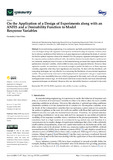Mostrar el registro sencillo del ítem
On the application of a design of experiments along with an anfis and a desirability function to model response variables
| dc.creator | Luis Pérez, Carmelo | es_ES |
| dc.date.accessioned | 2022-01-11T09:29:30Z | |
| dc.date.available | 2022-01-11T09:29:30Z | |
| dc.date.issued | 2021 | |
| dc.identifier.issn | 2073-8994 | |
| dc.identifier.uri | https://hdl.handle.net/2454/41706 | |
| dc.description.abstract | In manufacturing engineering, it is common to use both symmetrical and asymmetrical factorial designs along with regression techniques to model technological response variables, since the in-advance prediction of their behavior is of great importance to determine the levels of variation that lead to optimal response values to be obtained. For this purpose, regression techniques based on the response surface method combined with a desirability function for multi-objective optimization are commonly employed, since it is usual to find manufacturing processes that require simultaneous optimization of several variables, which exhibit in many cases an opposite behavior. However, these regression models are sometimes not accurate enough to predict the behavior of these response variables, especially when they have significant non-linearities. To deal with this drawback, soft computing techniques are very effective in overcoming the limitations of conventional regression models. This present study is focused on the employment of a symmetrical design of experiments along with a new desirability function, which is proposed in this study, and with soft computing techniques based on fuzzy logic. It will be shown that more accurate results than those obtained from regression techniques are obtained. Moreover, this new desirability function is analyzed in this study. | en |
| dc.format.extent | 29 p. | |
| dc.format.mimetype | application/pdf | en |
| dc.language.iso | eng | en |
| dc.publisher | MDPI | |
| dc.relation.ispartof | Symmetry, 13 (5) | |
| dc.rights | © 2021 by the authors. Creative Commons Attribution | en |
| dc.rights.uri | http://creativecommons.org/licenses/by/4.0/ | |
| dc.subject | ANFIS | en |
| dc.subject | Desirability function | en |
| dc.subject | DOE | en |
| dc.subject | FIS | en |
| dc.subject | Modeling | en |
| dc.subject | Regression | en |
| dc.title | On the application of a design of experiments along with an anfis and a desirability function to model response variables | en |
| dc.type | info:eu-repo/semantics/article | en |
| dc.type | Artículo / Artikulua | es |
| dc.contributor.department | Ingeniería | es_ES |
| dc.contributor.department | Ingeniaritza | eu |
| dc.rights.accessRights | info:eu-repo/semantics/openAccess | en |
| dc.rights.accessRights | Acceso abierto / Sarbide irekia | es |
| dc.identifier.doi | 10.3390/sym13050897 | |
| dc.relation.publisherversion | http://doi.org/10.3390/sym13050897 | |
| dc.type.version | info:eu-repo/semantics/publishedVersion | en |
| dc.type.version | Versión publicada / Argitaratu den bertsioa | es |



